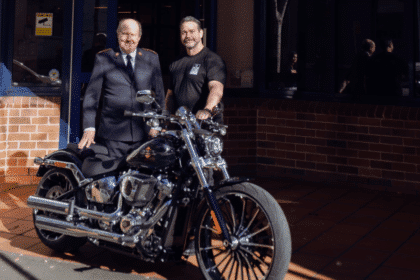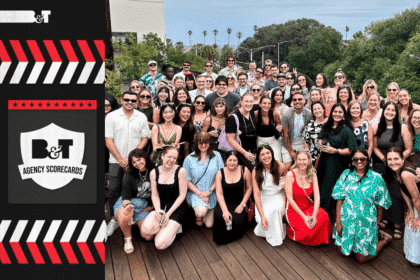Indie agencies are some of the most talked-about businesses in adland, from the likes of BORN, Today the Brave and the Bureau of Everything.
But some 15 years ago, Bree Johnson—arguably best known for her brand frank body—was the new kid on the block when she co-founded Willow & Blake, initially as a magazine which then grew into a full-service indie creative agency. As she looks back on the journey, B&T caught up with her mid-anniversary festivities to delve into the obstacles faced by women in the industry and how Johnson’s agency helped launch several female-founded brands in Australia.
B&T: How did you come to launch a small online magazine in your early twenties and how did it evolve into the full-service creative agency it is today?
Bree Johnson: We launched 15 years ago as an online magazine that was a place for the thoughts in our heads. We were three copywriters and we had a passion for writing and storytelling. It evolved into a copywriting agency because we saw a gap in the market at the time. There were a lot of creative and advertising agencies, but no one really focused on the written word, and I still think that storytelling and copywriting focus is our superpower.
We evolved into a full-service agency due to demand. We had clients coming to us wanting that full brand experience. And while I’m a copywriter by trade, I’m always biased to the words. Design is such a huge part of any brand. So while I think storytelling is our superpower now, it comes to life through design and copy, and we have more designers than we do copywriters. I don’t think anybody becomes a writer hoping to get rich quickly, but obviously, we hope to be successful.
A good agency focuses on its client success, so when I think about what success means, it’s not just the money we’ve made or how we’ve scaled. It’s more about our client’s success, and we’ve been able to help brands achieve that scale and achieve brand status time and time again. I think about Bondi Sands, DISSH, July and BMW, these are incredible brands that we’re very honoured to have played a part in. So when I think about what success means to me, it’s looking back and being proud of the work we’ve done.
B&T: What has changed in the industry since you co-founded W&B?
BJ: It’s evolved so much since we launched. When we started Willow & Blake 15 years ago, social media was emerging; Facebook was prevalent and Instagram was in its infancy. From a marketing perspective, the market was still dominated by larger brands with large advertising budgets, but as digital media and social platforms grew, we saw the democratisation of brands and a lot more of the startup communities start to come to the forefront, and consumers start to dictate the brand’s success.
Being able to connect with your customers has become more important. I think digital media and social platforms have fundamentally changed how we connect with consumers, and that’s similar from an agency perspective. We are seeing this rise of so many more indie agencies, and democratisation across that area as well. I think more choice inspires more creativity and more creativity is what we need in this industry.
B&T: How has Willow & Blake paved the way for the success of female-owned brands in Australia? What were their obstacles to success beforehand?
BJ: We are very proud to be a female-founded business. Frank Body is also female-founded, and we have definitely invested a lot in the female entrepreneur community through events, mentorship, angel investing, and we also launched a course called ‘Of Course’ for startup founders. I think the biggest way we’ve helped support them is by giving them confidence. There’s this idea of ‘if you see it, you can do it’. Jess and I speaking to female founders, showing up and being open about how we’ve achieved what we’ve achieved helps in this sense. We’ve always been an open book.
At W&B, one of our superpowers is that we niche down. We work predominantly in the health, beauty and fashion sector, and we like to specialise in brands for women. We understand women and we can speak to them. There are so many obstacles for women. I never truly understood the cultural norms that affect women’s ability to run and own businesses until I had children. I was looking at some stats, and I learned that women still do over nine hours more unpaid care work per week. A lot has changed over the last 15 years, though, and it’s great to see more female-owned brands and businesses coming up. But there’s always more work to do and I believe supporting women is the start to it.
B&T: Do you think there has been a shift in adland where agencies are more selective about the brands they work with? For instance, your stance on not working with fossil fuel, smoking, or gambling-related brands.
BJ: I think it’s becoming more common, and I think it’s important for agencies to think carefully about the brands they work with and make sure they’re value-aligned. We find the work is better when we’re value-aligned. It’s hard for an agency to turn down these more lucrative contracts, but for us, we’re at that stage where we know what’s important to us and what our non-negotiables are.
I’d advise agencies who want to make sure their work with clients is value-aligned to set guidelines from the very beginning. Be clear with what your boundaries are so that when opportunities do come up, you’ve already had that conversation, particularly if you have founders as well. Then it becomes an easier conversation to turn down specific clients. Generally, it’s just listening to your gut. You always know what you feel in your gut. If you have an inquiry or talk to someone who’s not feeling right, you have to listen to that.
B&T: What are your trends and predictions for the future of the industry? What advice do you have for the next generation of marketers?
BJ: Platforms and content might change, but storytelling will always remain important. I think in Adland, we tend to overthink things and we live in echo chambers. So always remember to put yourself in your consumers’ shoes and think about how they would be adaptable. The market is always changing, so make sure you can respond quickly so you stay relevant. And then my life motto, which is to risk it for the biscuit. Don’t be vanilla. Take risks and be bold. It’s our job to be creative.
B&T: Tell me more about W&B’s commitment to working on two pro bono projects a year. Why is this important?
BJ: This is a process we established early on. We’d love to work on more, but as a small agency, that’s the most we can commit to, and they’ve been some of the most meaningful projects. Eat Up is an example of one we’ve worked with, which is an organisation that supplies sandwiches to children who don’t get lunch otherwise. It’s important for us to give back to the community and to align not just with brands but with charities that align with our values. It’s also an opportunity for these brands who might not always have the resources for high-quality branding and the strategy work that we do, and honestly, the team loves it. They’re often the projects that we pour our most heart and soul into.








